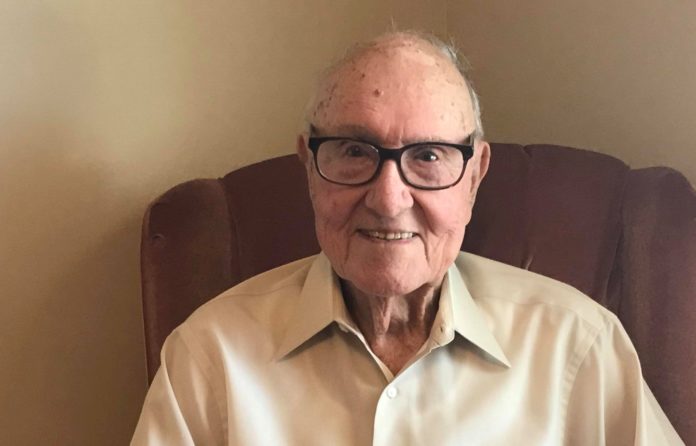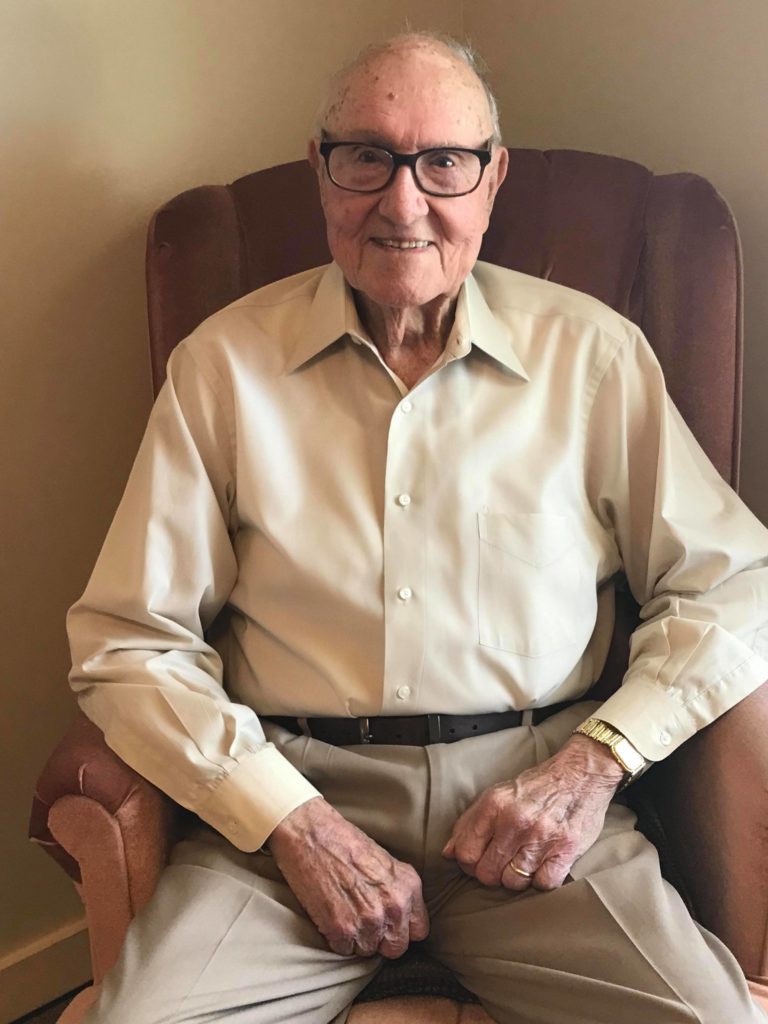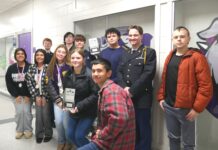
CULLMAN, Ala. – After graduating from Fairview High School in 1943, John Tillman, 94, soon received his draft letter. He was trained as a medic in the United States Army and would soon be in the jungles of Burma helping in the fight against the Japanese in World War II. The journey to Burma would require a 10-day trip by train through northern India, which Tillman can vividly recall.
He tells the story: “We went through some tea plantations and then these beautiful English walnuts, just huge. They had them painted white about 5- to 6-feet tall. Years ago, when I was small, we had people around here that were whitewashing the trees. They were green and lower was white and the tea, those little leaves were small, and the plants were low so that gave them a shade to help them to grow. We had a chance to see some farming and saw some water buffalo with a wooden plow. It was pretty black land. The year we were there, the report was that they lost 2,700 people from cobra bites. Those old thatch houses that they had there, those cobras would just move in there.”
One memory stands out to Tillman, “In those 10 days over in India, we stopped at all sorts of stations. We went into this station and it was beautiful. It was landscaped and a garden, but the thing that got my eye, we had a bunch of ladies lined up there. I wondered what in the word those ladies were doing. You wouldn’t believe what happened. Those ladies were picking lice off one another’s head. They took a bath in the same water as the cows and so on.. It was difficult if you got on the bank or something that they used that for a bathroom so you had to be careful where you were walking.”
Tillman said that the whole time he was overseas, he only ran into two other men from Cullman. One was Mr. King who worked in transportation for buses for Cullman County Schools and Mr. Patilla, who had a son that was principal at Fairview.
When Tillman arrived in Burma, the troops he joined had already traveled 500 miles. The Chinese soldiers fought with them and all the supplies they needed were airdropped. The Chinese dropped bags of rice that the troops carried on mules.
Tillman explained, “They shipped those mules over there by ship. I understand they would carry 300 at a time. They got all of them over there, but the Japanese got one boat with mules on it and torpedoed it. We lost those down there.”
Tillman liked to explore when he could.
He described the area: “They put us a few miles outside of Lido and it was really a nice place. It had been a village for the Burmese for a long time. On one side of the road we had baboons and on the other side we had monkeys. The baboons would holler up there and we must have had a tree of ripe fruit because I bet this tree I was looking at had 50 monkeys. I liked to walk around the area there and they had everything trimmed back nice. They had it cut back about a foot or two high cut from the yard we had. I was easing around on it and all of a sudden, I looked and I couldn’t believe what I was looking at. I was looking at an old animal pit. It still had those staves placed in there so that when the animal hit it, it would penetrate. So I was actually able to see one of those.”
The area also had tigers, and one of the last things Tillman did in Burma once the war was over was deer hunt at night.
He explained, “We’d take a Jeep with four people: a driver, one with a M1903 Springfield rifle, one carbine, one 45 pistol and for security we had a Thompson submachine gun under the backseat. We were pretty well protected. This particular night, we happened to turn around and look back and we could see some lights down there. That was the first time we ever encountered someone else deer hunting at that particular time. They sat and had our lights spotted and they waited to see what we were going to do. There were three tigers on the side of the road. We eased through there, but those tigers didn’t attack us.”
Tillman told of his time during the war, saying, “We had plenty of parachutes, and parachutes are canvas. I had a Class A uniform and two or three pairs of khakis all clean. They issued us a hammock that a fisherman would have loved to have. It was mosquito net sides with zippers in it. The first night in the hedge, I found some sticks just to elevate enough to get in there. We had three pairs of socks, three pairs of underwear and two pairs of fatigues. That was about it.”
They marched for 16 hours over two days to get over the top of a mountain to where the other troops were.
He said, “We didn’t have a motor pool. We had a stockyard! We had 4,300 mules and about five men handling all of those. We went over there and drew seems like 18-23 mules and some bamboo and built a corral out of it.”
Tillman continued, “We got a chance to haul some oats off the field. The drop field was only a short distance and they had constructed a nice little cemetery there. We had the 124th Cavalry from Texas National Guard, and the 475th Infantry people were fighting. While we were waiting for a plane to get out of there, this one company was instructed to take a hill. They took the hill and had no opposition. They were instructed to take another hill. They took another hill and had no opposition. Then they gave them the bad news to strike the third time and when they did, the Japanese were dug in and waiting for us. Out of that about 160 something men, we had about 123 casualties. We built a little cemetery right in the field there a short distance away.
“As we left, I met the mule packer- a man looked about 35 years old, rather well-built and seemed to be very healthy. I was looking for some fresh water that I could put this stuff in to kill the bacteria in it. He got off the mule and there was an old rusty sea ration can that had been over in a little water. He reached down there and got it, scooped it up and I watched him drink it. I finally said, ‘Aren’t you scared to drink that water?’ He said, ‘I’ve been drinking it for 500 miles.’ I shut up.”
Tillman was a surgical technician and the head of a four-person litter team. The litter team is responsible for treating and evacuating casualties. To evacuate patients, they had L4 and L5 single-engine planes.
New troops arrived, said Tillman, “Man, those Japanese took off. We had them outnumbered. They had a battle to take the Burma Road and we took it. We had turned the mules in because we had finished up. The only way to get out was to go up and we had vehicles then and of course we had the Burma Road so we had a place to travel on. Our unit, Mars Task Force, fell back into a reserve unit at that point.”
He continued, “I was out on a dry run deal and had my two-litter team with me. We had to fly these people out from time to time. I was up there on a place that the Chinese were being flown out of on that particular day. I was a corporal and looking after the evacuation of American troops and had a second lieutenant Chinese in change of the evacuation of the Chinese. The bamboo started moving back of us there and finally about four guys came scrambling through to get there. They told us to get our litter and put him on it. I saw them pick him up and his leg was dangling down. What he had tried to do, our interpretation, was catch a drop of that rice freefall and it came in and broke his leg. He was broken up a lot. He was Chinese and they had their evacuation. We didn’t have a MASH hospital (Mobile Army Surgical Hospital) back in those days; we had these surgical units. One of the major lieutenant colonels, the doctor, came up there and he saw that patient out there laying so he walked over there looking at him. I walked over there and reported to him and he said, ‘Do you have a litter team with you?’ I said, ‘Yes,’ and he said, ‘This man’s dying. Take him down there to the hospital down there.’ I got a couple of Chinese to join in with us and we turned him over for them to take care of.”
Tillman found a Japanese Mitsubishi A6M Zero aircraft one day and wanted a souvenir off of it, but he said that he couldn’t find anything.
He was also given a stretcher one day with a Japanese prisoner and he laughed, “I didn’t even have a band-aid on me, and I’m a medic. I looked him over and thought, ‘Boy, I don’t need a prisoner.’ I took him to the doctors and I was glad to be relieved of that responsibility.”
In part 3 of Tillman’s story, he tells of his life after returning home to Cullman after World War II.
Read part 1 at www.cullmantribune.com/2019/08/18/senior-spotlight-cullmans-john-tillman-part-1
Copyright 2019 Humble Roots, LLC. All Rights Reserved.
























